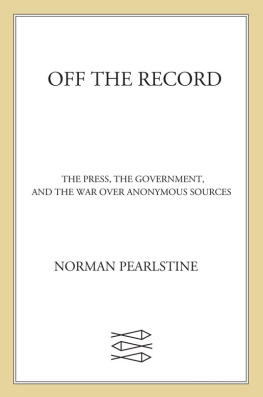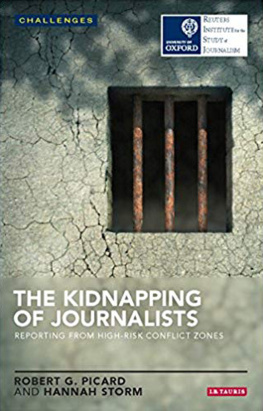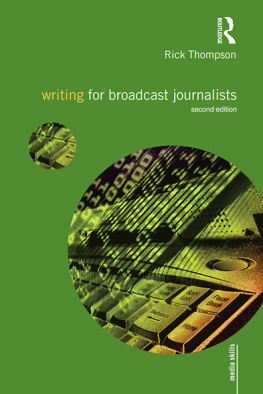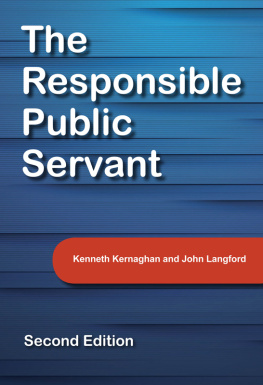
Journalists and Confidential Sources
Journalists and Confidential Sources explores the fraught and widespread reliance by journalists on anonymous sources, whistleblowers, and others to whom they owe an obligation of confidentiality. It examines the difficulties afflicting such relationships; analyses the deteriorating right to know and freedom of expression frameworks; and explores solutions and reforms.
The book discusses key Australian and international source protection ethics rules, statutes, court cases, law enforcement actions, and case studies. It highlights weakness in journalists professional practice codes governing confidentiality obligations; discusses inadequate journalistic appreciation of the importance of establishing clear terms and conditions underpinning confidentiality obligations; and identifies shortcomings in the law governing source protection. The book argues that despite source protection being widely recognised as an important ideal, source protection is under sustained assault, thereby undermining public access to information, and democracy itself. The work focusses on Australia but takes into account source protection in the United Kingdom, the United States, Canada, and New Zealand.
This timely contribution to the global discussion on the subject will greatly interest journalists, scholars, educators, and students especially in the areas of media law and policy, journalism, media and communication studies, and public relations; the legal fraternity; and anyone who communicates with journalists.
Joseph M Fernandez is an adjunct associate professor at the School of Media, Creative Arts and Social Inquiry, Faculty of Humanities, Curtin University, Australia.
Routledge Research in Journalism
23Economic News
Informing the Inattentive Audience
Arjen van Dalen, Helle Svensson, Anotinus Kalogeropoulos, Erik Albk, Claes H. de Vreese
24Reporting Humanitarian Disasters in a Social Media Age
Glenda Cooper
25The Rise of Nonprofit Investigative Journalism in the United States
Bill Birnbauer
26Tech Giants, Artificial Intelligence, and the Future of Journalism
Jason Whittaker
27Investigative Journalism, Democracy and the Digital Age
Andrea Carson
28Understanding Citizen Journalism as Civic Participation
Seungahn Nah and Deborah S. Chung
29Newsroom-Classroom Hybrids at Universities
Student Labor and the Journalism Crisis
Gunhild Ring Olsen
30Beyond Journalistic Norms
Role Performance and News in Comparative Perspective
Edited by Claudia Mellado
31Journalists and Confidential Sources
Colliding Public Interests in the Age of the Leak
Joseph M Fernandez
For more information about this series, please visit www.routledge.com/series/SE0347
Journalists and Confidential Sources
Colliding Public Interests in the Age of the Leak
Joseph M Fernandez
First published 2021
by Routledge
2 Park Square, Milton Park, Abingdon, Oxon OX14 4RN
and by Routledge
52 Vanderbilt Avenue, New York, NY 10017
Routledge is an imprint of the Taylor & Francis Group, an informa business
2021 Joseph M Fernandez
The right of Joseph M Fernandez to be identified as author of this work has been asserted by him in accordance with sections 77 and 78 of the Copyright, Designs and Patents Act 1988.
All rights reserved. No part of this book may be reprinted or reproduced or utilised in any form or by any electronic, mechanical, or other means, now known or hereafter invented, including photocopying and recording, or in any information storage or retrieval system, without permission in writing from the publishers.
Trademark notice: Product or corporate names may be trademarks or registered trademarks, and are used only for identification and explanation without intent to infringe.
British Library Cataloguing-in-Publication Data
A catalogue record for this book is available from the British Library
Library of Congress Cataloging-in-Publication Data
A catalog record for this book has been requested
ISBN: 978-0-367-47412-6 (hbk)
ISBN: 978-1-003-03541-1 (ebk)
Typeset in Sabon
by Apex CoVantage, LLC
For my granddaughters Emerson Rosa Fernandez; Mckenzie Elayne Wilson; and Maya Valerie Thorne, Zion Beatrix Thorne, and Indira James Thorne.
Contents
PART 1
Overview
PART 2
Ethics codes and the law
PART 3
Terminology, minefield, balancing interests, reforms
PART 4
Conclusion
Guide
In thanking all who shaped my journey in producing this work I am mindful of the difficulty in knowing how far up the river one must travel to know the source of the water. Many deserve credit for enlivening my professional journey, scholarly discovery and academic authorship. My inventory of mentors, teachers, colleagues, well-wishers, and family is long. My teachers at school and university laid strong foundations. The late Tan Sri Yeh Pao Tzu gave me my first big break in a journalism career. My line manager of many years, Professor Steve Mickler, was a pillar of support in my Curtin University career. Emeritus Professor Michael Gillooly of the University of Western Australia was a great source of inspiration in my law studies. The late Professor Pauline Sadler, and the late Professor Niall Lucy inspired me in many ways. Emeritus Professor Graham Seal AM gave immense encouragement in getting my last media law book published. Others to whom I owe a debt of gratitude are Professor Mark Pearson, my colleague in media law teaching and scholarship; Professor David Robie, my Reporters Without Borders colleague and academic publishing mentor; Mike Dobbie and other comrades at the Media, Entertainment and Arts Alliance who facilitated my research over many years; Michael Sinclair-Jones with whom I worked in collaboration on media freedom issues in the early days; and Daniel Bastard and other colleagues at Paris-based Reporters Without Borders who continue to enable my media freedom crusade. I am deeply grateful to the publisher for facilitating the publication of this work, to publishing staff involved at the outset, and to the production and editing team, especially copy editor Cynthia Harasty for her keen eye. I take responsibility for any remaining defects. Not least of all, I thank my wife, Elizabeth.
This book is about journalists promises of confidentiality to sources who seek anonymity. It examines the role of such promises in the context of informed public participation in how governments and powerful institutions govern them; how journalisms professional practice codes and the law operate in that field; what precautions journalists and their confidential sources must take when journalism relies on such sources; and what law and other reform attention is needed for the safeguarding of such arrangements. In this work references to sources, unless otherwise indicated, refers to confidential sources. More is said about different types of journalists communications with contacts or sources in (p. 149). While journalists are the books focus there are lessons for many others, especially those who rely on journalists confidentiality undertakings, and those who are affected by such undertakings.







